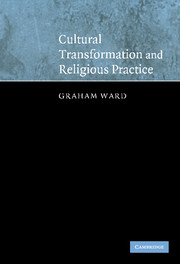Book contents
3 - The governing question III: what is the relationship between religious practices and cultural transformation?
Published online by Cambridge University Press: 15 December 2009
Summary
We are now in a position to approach that third question: on the basis of the two previous examinations, how can we describe the relationship between Christian discursive practices and the production and transformation of public narratives of what is true or what Adorno calls ‘monopolies of public opinion’? As I have suggested, answering this question will also furnish us with an account of the apologetic nature of Christian discourse. That shared knowledges are in a continual state of transformation, I take as proven, but while the previous section dealt with the poetics or governing structures of that transformation and demonstrated its inevitability, the scope of the negotiations and exchanges fundamental to the nature of society and what exactly is being transformed still require analysis. Althusser, in his widely influential essay ‘Ideology and Ideological State Apparatuses’, informs us that the means of cultural production (education, but also other State apparatuses such as the Church and the army) ‘ensure subjection to the ruling ideology or the mastery of its “practice”’. But this observation begs a question which must also be answered in relation to shared knowledges of what is true (which I take as being very close to Althusser's ‘ruling ideology’). That is, to what extent if at all can we talk of a coherent and unified object such as ‘public opinion’ or ‘ruling ideology’?
- Type
- Chapter
- Information
- Cultural Transformation and Religious Practice , pp. 117 - 174Publisher: Cambridge University PressPrint publication year: 2004

